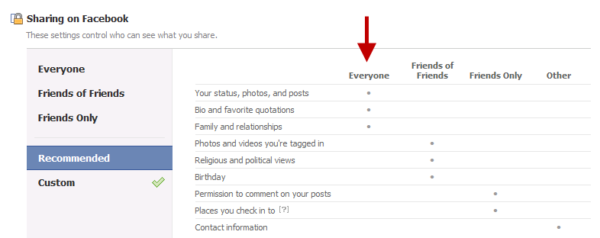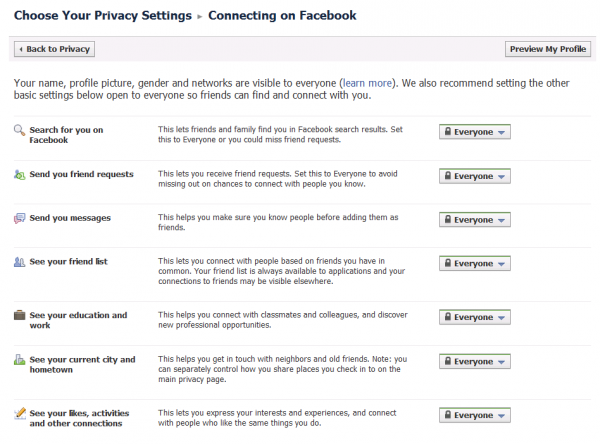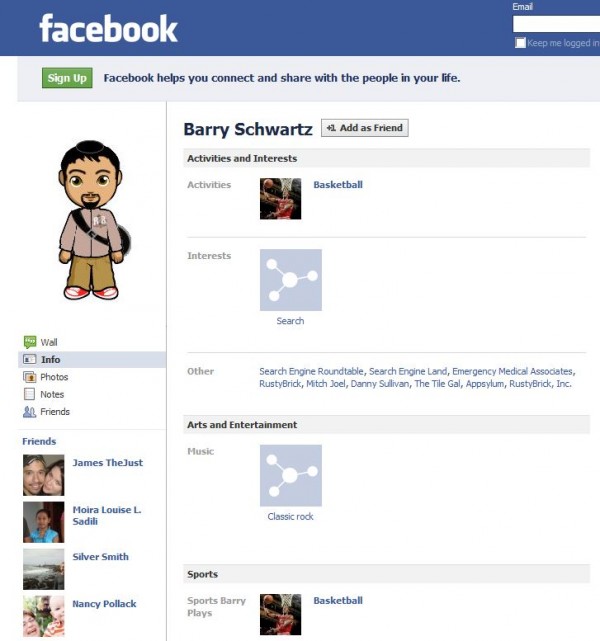How Facebook Enables The Google Social “Scraping” It’s Upset About
I wrote a very long examination of the issues that Facebook employed a PR firm to publicize, about how Facebook feels Google may be violating privacy with its Google Social Search product. Here’s a shorter look, especially from the angle of how Facebook itself has enabled Google to do what Facebook is now complaining about. […]

Facebook said this about Google, in its statement from my original article:
We wanted third parties to verify that people did not approve of the collection and use of information from their accounts on Facebook and other services for inclusion in Google Social Circles—just as Facebook did not approve of use or collection for this purpose.
Facebook has since said it should have handled the issue in a more “transparent” manner, and is no longer working with the firm of Burson-Marsteller, but Facebook hasn’t refuted the allegations that the firm was trying to get out.
This is where an email that Burson-Marsteller sent to privacy and security researcher Christopher Soghoian is instructive. Soghoian was so put off by the pitch that he posted it online, sparking today’s headlines. In part, the email explained:
Google Social Circles does not ask “permission” from individuals who will have their profiles, connections and other personal data shared in the new network. Google will simply “scrape” their information from dozens of sources and compile the data into one massive dossier aligned directly with user’s personally identifiable information.
Got it? Google is “scraping” up this information from Facebook. Not said is how Facebook itself is encouraging people to put the information out for such scraping, through recommendations it makes in its own Facebook privacy settings.
No Choice: Facebook Shares Your Name & Sex
By default, your name, your profile picture, your gender and any Facebook “networks” you belong to are shared with the world. Facebook gives you no choice with this. If you want to be on Facebook, that’s all information you have to give up to the entire world.
Facebook Recommend Making Family Public & More
After that, you can make some decisions on what to share, but Facebook pushes you toward certain public choices. Here are the recommended settings for how information posted to Facebook should be shared with others:
Facebook is recommending that its users make their status information, photos, posts, bios, favorite quotations, family and relationships public to the world. That includes, as I’ll explain more below, getting gobbled up by Google.
Facebook Recommends Making Friends Public
Elsewhere, Facebook has yet more privacy settings you can control. In the “Connecting On Facebook” area, everything is recommended to be open to “Everyone,” as you can see:
Included on the list of connections that Facebook encouraging users to share with the world are what they like through the service, their hometown, where they worked and everyone they’ve declared to be a friend on Facebook.
But surely, you might think, “everyone” means “everyone on Facebook” and not “everyone in the world.” You’d be mistaken, if you believed that. Some of this information may indeed show up on your public web page that is explicitly shared by Facebook with Google and other search engines.
Facebook Recommends Putting Your Public Information In Google
A third area of Facebook’s privacy settings deal with search engines. By default, Facebook recommends that you put a page out about yourself to Google and other search engines:
That page will be populated with some of the information that Facebook earlier encouraged you to share with the world. This could include a number of your friends and other information, as happens with my news editor here at Search Engine Land, Barry Schwartz:
That page then ends up in Google (along with other search engines like Bing):
If Facebook were really concerned about Google “scraping” personal data off these pages, it would have never created them back in 2007, in order to chase Google traffic. It certainly wouldn’t be creating them by default for every new user on Facebook.
How About That Facebook Open Graph?
Now, these personal pages don’t contain all the “everyone” information that Facebook has encouraged people to share. For example, I’ve never seen hometowns being listed on these pages. You only see that if you’ve logged into Facebook.
Similarly, while some friends are shown, these pages don’t show them all. So how else is Google doing all these things that Facebook’s PR firm was trying to educate people about, which includes:
Google is taking different parts of people’s lives—parts they deliberately separated onto different sites—and presenting the collage Google created to other people. Reminiscent of Google Buzz, Google’s latest plan totally disregards the intimate and potentially damaging details that could be revealed, including sexual orientation, political affiliation, personal connections, etc…
I suppose that Google might tap into the Facebook Open Graph. That graph, to my knowledge, has all the information that Facebook had handily encouraged people to collect in one place, details like their sexual orientation, political affiliation, personal connections, etc.
If Google did this, presumably it would be with Facebook CEO Mark Zuckerberg’s blessing, since when he announced the Facebook Open Graph, he was all for the idea that everything should be connected socially:
Today at our third f8, we are making it so all websites can work together to build a more comprehensive map of connections and create better, more social experiences for everyone. We have redesigned Facebook Platform to offer a simple set of tools that sites around the web can use to personalize experiences and build out the graph of connections people are making.
Of course, Google can only do this officially if it has Facebook’s blessing to access the Open Graph. That means agreeing to Facebook’s terms. Google, for reasons it continues to not make clear, doesn’t like those terms. It prefers to build these connections using what’s out on the public web.
It’s Facebook’s Way Or The “You Violate Privacy” Highway?
That, of course, seems to have caused Facebook to become paranoid to the degree that it authorized a PR firm to stir up concerns that Google was somehow doing something dubious. Elsewhere from the company’s pitch:
On all of the sites Google scrapes, you can change your mind. You can delete your account. You can make or break connections to other people. How do you remove this information from the database that Google is sharing with hundreds of millions of people? You can’t.
Actually, you can. If you delete a friend on Facebook, that’s going to break the connection that Facebook exposes to the web and thus further break the connection that Google may have formed by reading web content.
In the end, it’s really kind of a stunning counterplay by Facebook. Facebook has encouraged its users to share information with “everyone” and actively published that information out onto the open internet. But because Google doesn’t want to play by Facebook’s rules to harvest this publicly published information, Facebook seems to want to cry foul.
If Facebook were really concerned about this, at the very least, it would close down all the public search pages that it published into Google. But that’s not going to happen, because that’s too much in Facebook’s interest.
Related Stories
- Drill (Down), Baby, Drill: Facebook’s New “Simple” Privacy Settings Still Pretty Complex
- Google Settles FTC Charges Over Buzz, Agrees To 20 Years Of Privacy Audits
- Mine The Web’s Socially-Tagged Links: Google Social Graph API Launched
- Facebook: You’ve No Right To Export Email Addresses (Unless It’s To Yahoo & Microsoft
- Facebook On Social Search: ‘We Want To Work With Everybody’
- Google & Facebook: If You’re So Smart, Work It Out!
- Has Facebook Become The Master Key To Unlocking The Web?
- Examining Facebook’s “Smear Campaign” Concerns About Google Social Circle
Contributing authors are invited to create content for Search Engine Land and are chosen for their expertise and contribution to the search community. Our contributors work under the oversight of the editorial staff and contributions are checked for quality and relevance to our readers. The opinions they express are their own.
Related stories
New on Search Engine Land




